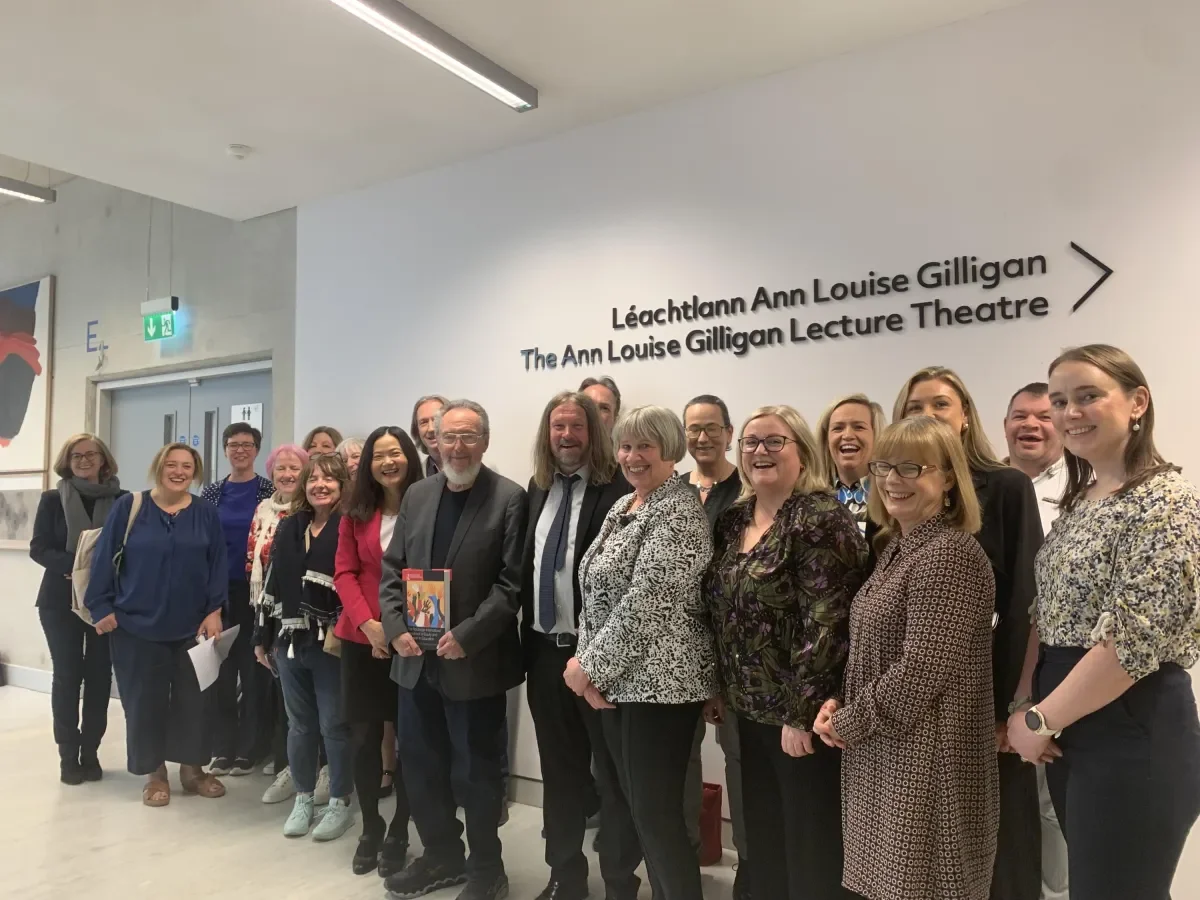

DCU Educational Disadvantage Centre’s Spatial Turn Symposium and Launch of The Routledge International Handbook of Equity and Inclusion in Education
DCU Educational Disadvantage Centre’s International Interdisciplinary Symposium on The Spatial Turn for Equitable Inclusive Systems in Education and launch of The Routledge International Handbook of Equity and Inclusion in Education (Downes, Li, Van Praag & Lamb, Eds. 2024), took place in DCU Institute of Education, St. Patrick’s Campus, Drumcondra on June 5th 2024.
At the event, The Routledge International Handbook was launched by Professor Michael Apple, John Bascom Professor of Curriculum and Instruction and Educational Policy Studies, University of Wisconsin, Madison, USA. Professor Apple was the first lead editor of this Routledge International Handbook series and was selected as one of the fifty most important educational scholars of the 20th Century. His books Ideology and Curriculum, and Official Knowledge were also selected as two of the most significant books on education in the 20th Century.
With over 100 attendees, the Symposium included a range of international experts from the US, Canada, Scotland, England, Malta and Ireland, as well as national policy makers, DEIS teachers and community projects, and extended to a School of Human Development June 6th related Symposium on The Spatial Turn for Hermeneutics and Being to scrutinise conceptual foundations of being underpinning wellbeing in education. The Symposium opening and keynotes were also livestreamed online with registered attendees online from 14 different countries across Europe, North America and Asia.
In his wide-ranging keynote presentation, Spatial Politics and the Realities of Inclusion and Exclusion to launch the Handbook, Professor Apple highlighted the importance of “acting as critical secretaries of critically democratic education” where “The answer is not ‘replacement’, but creating concentric circles and respectful critical dialogic forms and alliances whenever possible.”. Addressing the Handbook’s central concern with promoting concentric spaces for equitable inclusive systems, Professor Apple stated that “Concentric circles of inclusion, care, and openness cannot be fully created, extended, and defended unless we more fully recognize and understand an expanded sphere of spatial relations of exclusion both in schools and outside of them.”

Examining spatial marginalization in Indian and Korean contexts, drawing on the Influence of Freire’s “Peoples Science” movement, and Apple/Beane’s, Democratic Schools, he highlighted gender spatial inequalities impacting on school attendance and engagement
and ‘Public spaces as critical resources’ for ‘Interrupting historical amnesia’. He concluded that The Routledge International Handbook of Equity and Inclusion in Education “provides us with crucial paths to engage with the multiple tasks so necessary for our continued collective work.”
Professor Guofang Li, Canada Research Chair (Tier 1) in Transnational/Global Perspectives of Language and Literacy Education of Children and Youth, University of British Columbia, and co-editor of the Handbook, gave a keynote presentation on The Interplay between Space, Equity and Inclusive Systems. She highlighted how her work has “Witnessed the Educational Field as Diametric Spaces of Us/them; home/school; haves/have-nots, urban/suburban” and in “raced, classed, gendered” terms. Highlighting concerns with ideology in school space, including privatization in the public space of schools,. Professor Li identified “Ways Forward: Toward Building Concentric Relational Spaces” as part of “A ‘New’ View of Space” in schools and classrooms as “A Concentric Connected System” to “identify ‘invisible walls’, ’hidden borders’, ‘undetectable blockages’ ”, as developed in the Handbook.
Opening the Symposium, Professor Paul Downes, lead editor of this Routledge International Handbook, and Director, DCU Educational Disadvantage Centre, highlighted how major understandings of othering regarding gender and ethnicity have overlooked both the fundamental spatial systemic features of this process as diametric opposition and alternative crosscultural concentric spaces of assumed connection to reconfigure othering, hierarchy and exclusion. Professor Downes highlighted current diametric spatial systems identified in the Handbook as requiring immediate strategic reform, such as suspension and expulsion from school, developing assertive outreach spaces to engage marginalised groups rather than characterising them as ‘hard-to reach’, overcoming diametric spatial splits between nature and culture, health and education in schools towards more concentric spaces. He explored the affinity between conceptions of ‘walking alongside’ in a Canadian indigenous people’s context, Australian Aboriginal conceptions of connection and separation, as examples from the Handbook of further appeals to concentric spaces of relation.
The panel discussion in response to Professor Apple’s keynote included Professor Barbara Read, University of Glasgow, Professor Liz Todd, Newcastle University, Dr. Martin Brown, Head of School of Policy and Practice, DCU Institute of Education, as well as Professor Downes and Professor Li. The panel was Chaired by Dr. Jones Irwin, Associate Professor of Philosophy of Education and Educational Disadvantage Centre’s Thematic Coordinator, Critical Theory and Community Development.
